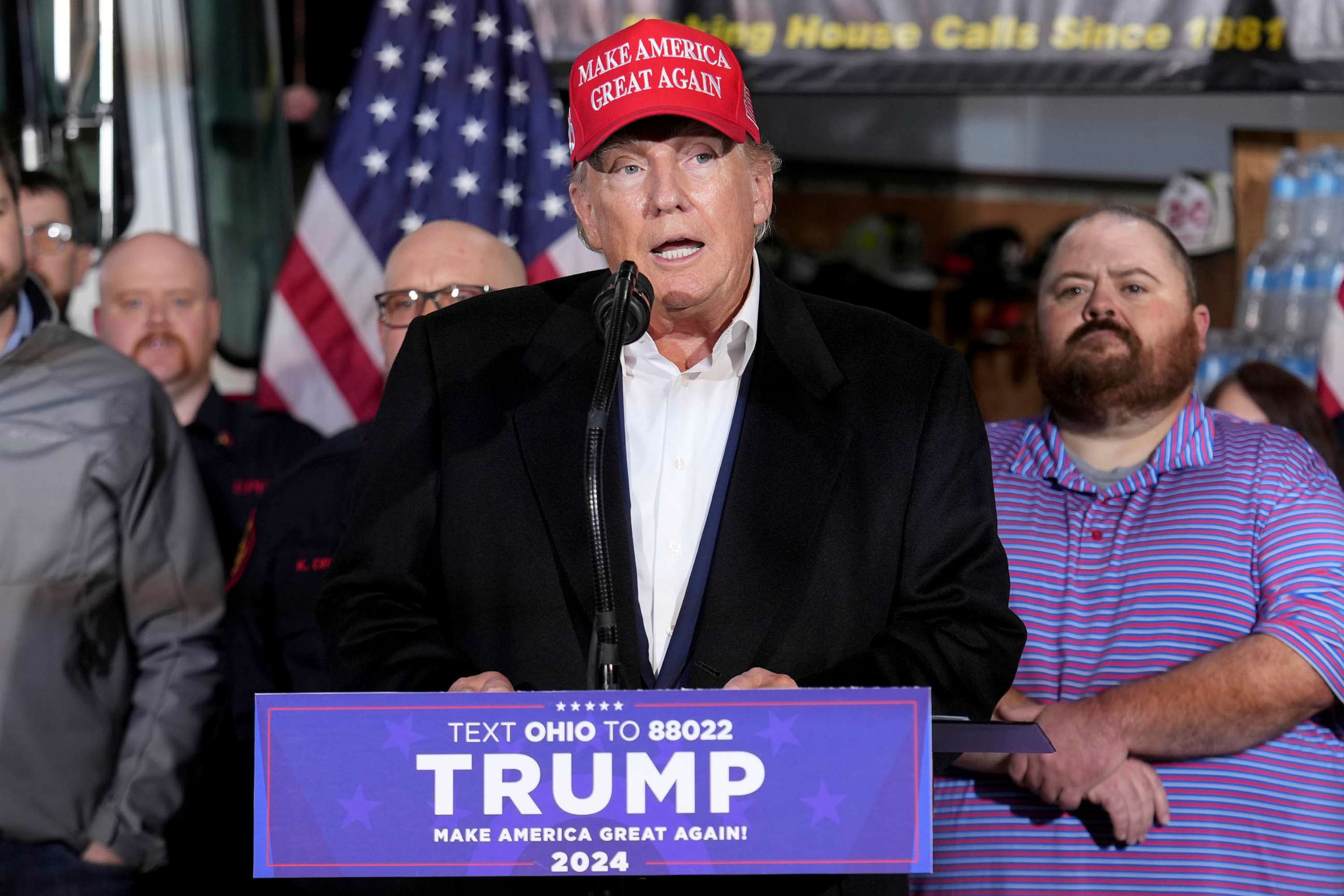Trump tours Ohio town near toxic train derailment
His campaign visit comes a day before Transportation Secretary Pete Buttigieg.
Former President Donald Trump on Wednesday toured the Ohio town near where a Norfolk Southern freight train carrying toxic chemicals derailed Feb. 3.
Sporting one of his trademark red "Make America Great Again" hats, the GOP presidential candidate delivered remarks at the East Palestine Fire House, telling residents "loud and clear you are not forgotten" while slamming current President Joe Biden's response to the incident.
"Over the past few weeks the community has shown the tough and resilient heart of America. This is really America right here," Trump said, while flanked by East Palestine Mayor Trent Conaway, Ohio GOP Rep. Bill Johnson and Ohio GOP Sen. J.D. Vance, members of the firehouse and local officials. "Unfortunately, as you know, your goodness and perseverance were met with indifference and betrayal in some cases."

"They were doing nothing for you," Trump said, while claiming that the federal response was beefed up only in response to the announcement of his campaign trip, a claim the White House says is false.
"What this community needs now are not excuses ... but answers and results," Trump said, while also praising local responders.
Trump had earlier toured Little Beaver Creek — an Ohio river tributary near the site of the derailment three weeks ago — where he also met with supporters who had gathered on the edge of the muddy lot. Trump also said his team had coordinated the delivery of thousands of bottles of water and cleaning supplies for the community — including "Trump water."

The trip comes amid an intense political showdown between the former president and the current one and his administration, which critics claim failed to quickly address the gravity of the health and environmental concerns resulting from the incident.
The White House has responded that the Environmental Protections Agency and Department of Transportation employees had been on the ground since "day one."
The Trump administration and GOP-led Congress rolled back many Department of Transportation regulations over the course of Trump's first two years in the White House, including many that were in line with what rail lobbyists wanted, but it's not yet clear if any specifically contributed to this accident.
"Congressional Republicans and former Trump Administration officials owe East Palestine an apology for selling them out to rail industry lobbyists when they dismantled Obama-Biden rail safety protections as well as EPA powers to rapidly contain spills," White House spokesperson Andrew Bates said in a statement.
Trump's visit comes as news that Transportation Secretary Pete Buttigieg on Thursday will meet in East Palestine with community members affected by the train derailment on the same day the National Transportation Safety Board is set to release its preliminary investigative report on the incident.

"As the secretary said, he would go when it is appropriate and wouldn't detract from the emergency response efforts," an administration official said. "The Secretary is going now that the EPA has said it is moving out of the emergency response phase and transitioning to the long-term remediation phase.
Buttigieg has faced intense criticism from political opponents who said his first response to the crash -- 10 days after it occurred -- along with the lack of any in-person visit -- was insulting to the majority Trump-voting county.
A DOT spokesperson had told ABC News of the secretary's conversations with Ohio GOP Gov. Mike DeWine and Pennsylvania Democratic Gov. Josh Shapiro about his plans to visit the location once preliminary local investigations were underway.
"His visit coincides with the NTSB issuing its initial findings on the investigation into the cause of the derailment and will allow the Secretary to hear from USDOT investigators who were on the ground within hours of the derailment to support the NTSB's investigation," an administration official said.
--ABC News' Amanda Maile Ben Gittleson and Cheyenne Haslett contributed to this report.



